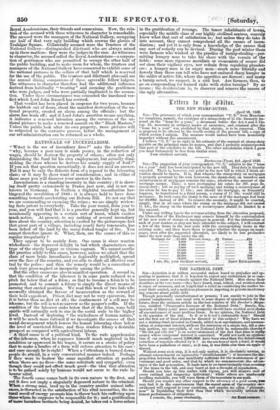RATIONALE OF INCENDIARISM.
" WitAr is the use of incendiary fires P" asks the rationalist: "why, because a poor man is made poorer, in the reduction of wages, should lie destroy the _property of others ; often not only aiminishing the fund for his own employment, but actually dimi- nishing the store whence he derives his scanty supply of food?" If you ask that question sarcastically, it does not need an answer. But it may be only the didactic form of a reproof to the labouring class ; or it may 'be sheer want of consideration; and in either of those cases you will discover your answer in the fads.
Ineendiarism is a standing enormity in this country'; it is show- ing itself .pretty extensively in France just now, and is not un- known in Germany. In Gallieia a frightful incendiarisin
liar- bingeredthe revolution of 1848: it is always held to have done something towards accelerating our Reform Bill. Do not say that we are commending or excusing the crime ; we.are simply review- ing facts patent to everybody. Take the year round, from year to year, and you will find that it is a practice generally kept up, but occasionally appearing in a certain sort of burst, which excites much notice. At present, to say nothing of several incendiary fires about the country, attention is excited by the picturesque fact that great part of a village, including nearly forty tenements, has been licked off the land by •the many-forked tongue of fire. You cannot therefore ignore it. What,then, are ihe causes of this so
irregularity ? ey appear to be mainly four. One cause is sheer wanton ed deliaht in bad which characterizes one
of the sturdy e practice solely'to-this cause, however, -unless we admit that the class of mere brute incendiaries is deplorably multiplied, spread over the face of the country, end yet able -to elude all effective con- trol by the police : and then the remedy would be a correction of such very gross neglect or incapacity among the police. Bathe other causes are also in manifest operation. A second is, that the condition of the labourer is in some parts reduced to a pitch far below that of a felon ; so that to become a felon is to be promoted, and to commit a felony is simply the direct means of aerning that envied position. We read This week of two lads who aeowed1y obtained the favour of incarceration as the reward of their bold expedient. Prison diet may not be very epicurean, but it is better than no diet at all.; the confinement of a cell may be irksome, but the cell is not so narrow as the pauper's coffin. If the condition of the labourer sinks below that of the felon, some bold spirits will naturally seek to rise in the social scale to the higher level. Instead of deploring "the wickedness of human nature,* it will be much more rational if we investigate the causes of that social derangement which lowers the honest labouring class below the level of tonaicted felons, and thus renders felony a desirable prospect as compared with agricultural labour. - A third cause is of a political kind. To the rude apprehension of the labourer, when he supposes himself much neglected in his aondition or oppressed in his wages it occurs as a stroke of policy that to make a bonfire of a farm will enforce attention to his case : and sure enough he is right When a Cottenham is burned down, people do attend, in a very concentrated manner indeed. l'erhaps if they were to bestow the same manifest attention at periods when there are no ftres—the same solicitude and sympathy, even though they could not effect much good—the idea' that attention is to be gained solely by beacons would not occur to the rude la- bourer mind.
The fourth cause comes back in its own nature to the first, and yet it does not imply a singularly depraved nature in the criminal. When a strong man, bred up in the country amidst animal influ- ences, is thwarted in the satisfaction of his vital necessities, the na- tural oil 'of energy prompts him to throw back his suffering upon those whom he supposes to be responsible for it; and a gratification of more harmless mstincts being denied, he takes out a fierce solace
wick ess—the de gar or vicious vagrant. We cannot ascribe
in the gratification of revenge. The tamer inhabitants of towns, especiallY the middle dais of our highly civilized centres, scarcely know what that sort of satisfaction is; but unless they do take it into 'account, they cannot comprehend all the causes of incen;. diarism ; and yet it is only from a knowledge of the causes that any sort of remedy can be devised. During the _past winter there were farmers who winked at the practice of turnip-stealing—per- mitting hungry man to take his share with the vermin of the fields : some more rigorous moralists or economists of course did not close their vigilant eyes, nor refrain from repulsing plunder- era: a hungry -man is an angry man—much more literally and fiercely than those can tell who have not endured sharp hunger in the midst of active life, where the appetites are -fiercest; and many a turnip saved, we suspect, is a rick lost. Are farmers, then, to go on -compounding for burned ricks with stolen -turnips ? By no means : the desideratum is, to discover and remove the causes of the ugly alternative.


























 Previous page
Previous page